Lean years for Singapore football to continue unless leaders make major changes
SINGAPORE — When Shahril Ishak lifted the AFF Championship trophy on a muggy December night in 2012 at the Supachalasai Stadium in Bangkok, there was hope that Singapore – who had not been in the title contention talk before the tournament – could use the triumph as a platform to scale greater heights.
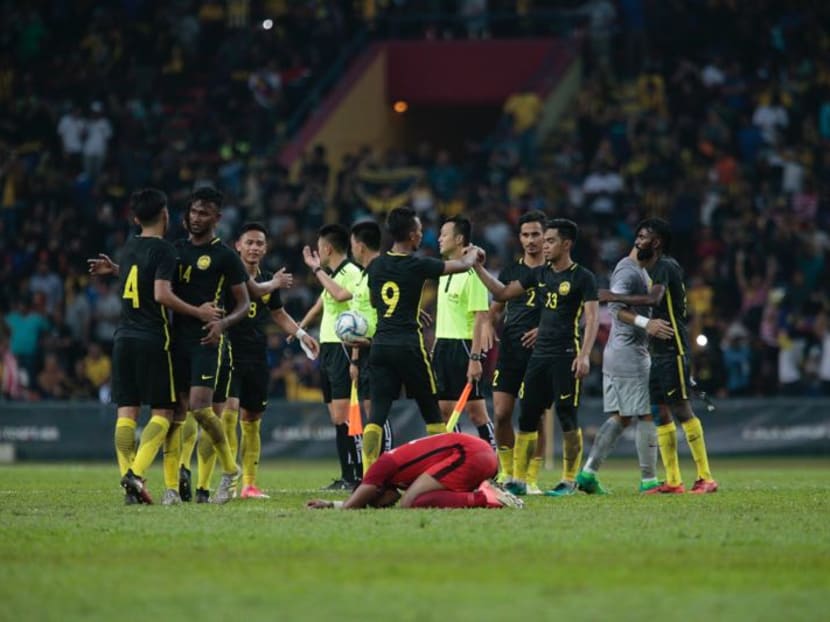
A Singapore player reacts after the loss to Malaysia at the SEA Games. Photo: Jason Quah/TODAY
SINGAPORE — When Shahril Ishak lifted the AFF Championship trophy on a muggy December night in 2012 at the Supachalasai Stadium in Bangkok, there was hope that Singapore – who had not been in the title contention talk before the tournament – could use the triumph as a platform to scale greater heights.
It has since become apparent, however, that the Lions’ fourth crowning as South-east Asian kingpins only served to paper over the cracks in the local game, which have only got deeper since.
The senior national team crashed out at the group stages with a whimper in the following two editions, while the quest for that first-ever South-east Asian (SEA) Games’ gold ended in the group stages in 2015 and most recently in Kuala Lumpur last month.
Even as regional minnows like Myanmar and Cambodia make strides and heavyweights like Thailand and Vietnam pull further away, Singapore football continues to be plagued with the problems that have afflicted it over the past decade.
The Football Association of Singapore’s (FAS) efforts to bring back the glory days have seen mixed results – at best – and it is hardly a coincidence that the local game’s struggles have largely come under the leadership of former president Zainudin Nordin and current general secretary Winston Lee.
Zainudin, who served from 2009 until last November, has since succeeded by Lim Kia Tong, while Lee has held his role since 2008, as part of a FAS council that includes vice-presidents and council members.
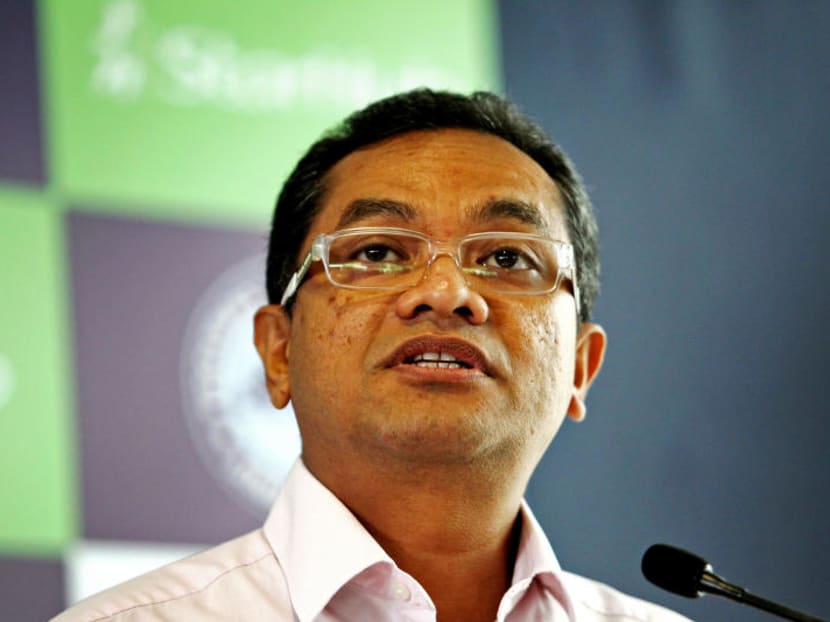
However, some in the previous council have indicated that members were rarely consulted regarding key matters.
“To be honest, there wasn’t a lot of engagement then,” former national captain Razali Saad, a council member from 2013 to 2016, told TODAY in a previous interview.
“Important decisions on football were made without much discussions or engagement with the entire council. For example, a policy would be drawn up (without any prior discussions) and that was it. Everybody would have to agree to it.”
Lim, a former vice-president, added: “The previous president had his leadership style. But (if elected), I will handle the FAS very differently... we will work in a consultative manner, and decisions will be made jointly but the buck will still stop with me.”
Former Singapore international R. Sasikumar, who scored the only goal in the 1998 Suzuki Cup final, bluntly stated that whatever happens on the pitch is a good barometer of what goes on off it.
“If you don’t have a cohesive unit at the top, that will show and reflect on what the athletes do on the pitch,” the managing director of sports marketing agency Red Card Global told TODAY.
“For every action, there’s a reaction – the action is when you put people who are not qualified, this is what happens. Everything starts at the top and the buck stops with the guy who runs the organisation.
“So (there is) no surprise (with our failures)… unless you get the house in order, and put proper systems in place where you take care of the athletes, things will never change.”
IN A MESS
Things certainly didn’t change in Kuala Lumpur, where the Young Lions failed to progress past the group stage for the sixth time in nine SEA Games since an Under-23 age limit was imposed in 2001.
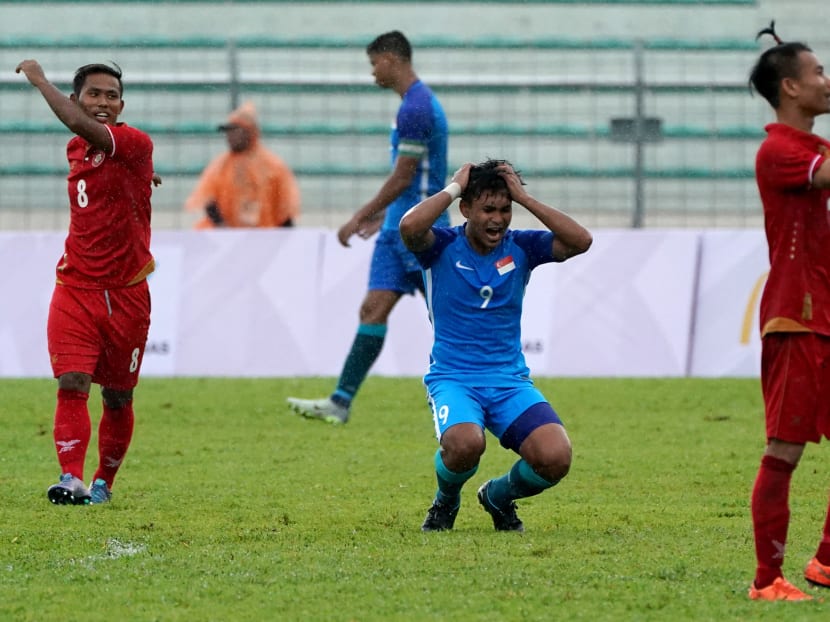
In a year when the focus should have been coming out with a blueprint for the Young Lions to at least improve on their abysmal performance two years ago on home soil, the FAS’ energies and attention were instead sapped and taken up by the elections, which further laid bare the problems in local football.
First, there was a lengthy delay of almost 17 months between the FAS complying with world governing body Fifa’s directive to elect office-bearers and the elections being held this April, five months after a revised constitution was finally voted through.
When it came time for teams to be assembled, only two were eventually formed to contest the elections, one led by Lim and the other by flamboyant Hougang United chairman Bill Ng, who would cause a maelstrom when he dropped the bombshell that he had donated S$500,000 to the FAS via Tiong Bahru Football Club (TBFC), an amateur club which he also owns. Ng claimed that he did not know it would go to the Asean Football Federation (AFF) for a Football Management System, a claim that the FAS swiftly refuted.
The Dickensian saga continued with raids on Ng’s clubhouses, which ran jackpot operations, and the FAS headquarters, as well as the man himself being arrested by the police along with Zainudin and Lee to assist in a probe into the suspected misuse of funds at TBFC.
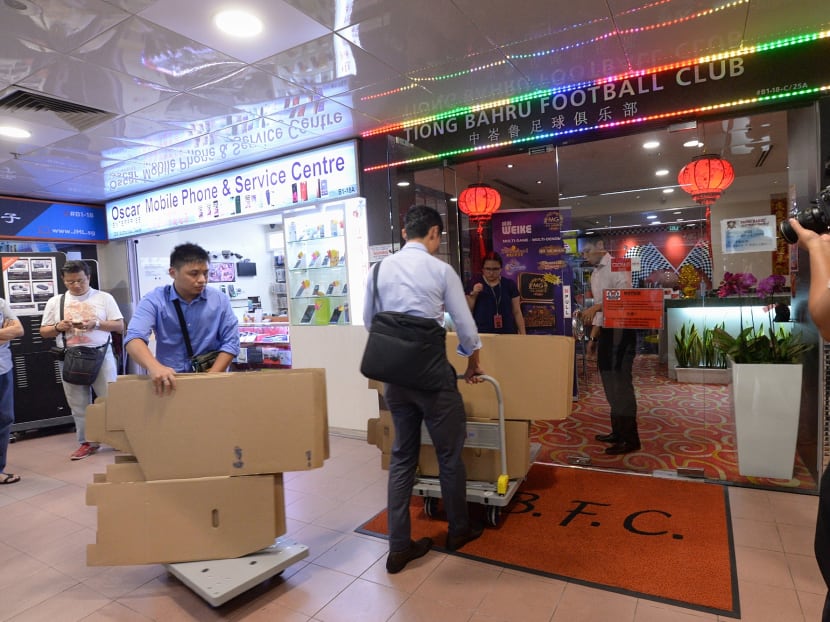
Meanwhile, the Games-bound U-22 side lost all four of their matches in the Dubai Cup in March, adding to the eight defeats in the preceding 11 matches stretching back to last March. The Young Lions S.League side, known as the Garena Young Lions, which contributes most of the national U-22 players, then saw head coach V. Selvaraj stepping down in May due to personal reasons and Richard Tardy, who led the U-22s during international matches, stepping in to fill the void temporarily.
A S.League club official, who declined to be named, noted it was no surprise that Singapore did not do well at the Games amid what can be perceived as distractions, but believes the problems run far deeper.
“Yes, you can say that the elections was a messy time for local football because of the scandals it caused, but poor performances also don’t happen overnight, or within the span of one year,” he told TODAY.
“A player does not suddenly become unable to trap the ball because some scandal about jackpot machines cropped up. The team can’t string three passes together because the players aren’t technically sound enough, not because they were worried about who would win the elections.
“Many people I spoke to (before the Games) already wrote off our chances of progressing… I think it was quite obvious from the friendly results and performances prior to the tournament that they would find it hard to beat the likes of Myanmar and Malaysia.”
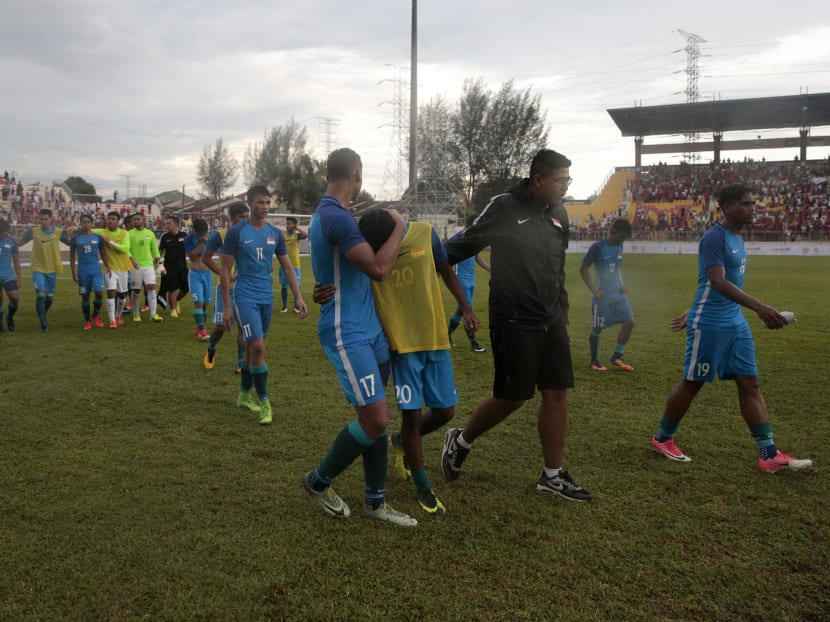
THE WAY FORWARD
The focus should now be on the “real issues” of poor youth development, which has been reflected in the results. The Singapore Under-15s’ 0-12 spanking by an Indonesian U-16 side in a friendly three months ago raised plenty of eyebrows and continued the trend of dismal results at various youth levels.
According to a report in The Straits Times in June, Singapore won just 10 and lost 39 of a combined 62 matches from 2014 to 2016 across its age-group sides from U-14 to U-23 level. Singapore have not qualified for the last 19 editions of the Asian Football Confederation (AFC) U-19 championships and the last four for the AFC U-15 edition. At regional level, no Singapore side has made it out of the group stages at the Asean Football Federation (AFF) U-19 and U-16 championships for the past seven and four editions in which they have participated respectively.
Hougang head coach Philippe Aw reiterated the importance of having a long-term plan to combat the problems of development and equally, the commitment to see it through.
“Why don’t we just say ‘ok, this is what we are going to do and we will follow this’ and make it known to the public that things are not well, (but) that we have this plan and we are trying to improve it based on this plan,” he said.
“If results don’t come early but we see the progress (then we should continue), not change and throw away the plans halfway through. I think it’s happened many times… where are we now? We are nowhere.
“Along the way there must be checkpoints to see whether we are progressing… Of course at senior level, results do matter (more)… but at the younger levels, we need to be a bit more patient and give more time.”
SLIM PICKINGS
There was a sense of change stirring in the air when Lim led his Team LKT to victory but apart from unveiling plans to combat governance issues and hiring a new deputy general secretary in Yazeen Buhari last month, it’s been more or less radio silence since from the FAS headquarters at Jalan Besar Stadium.
Meanwhile, the S.League is still teetering on its last legs, hit by the latest body blow on Friday night (Sept 8) that funding for the 2018 season could potentially be slashed by almost half to S$8.5 million. Already, Singapore’s only professional sports league has grappled with declining attendances and stagnating salaries over the years, making a football career unappealing to youngsters, which in turn shrinks the talent pool at elite level.
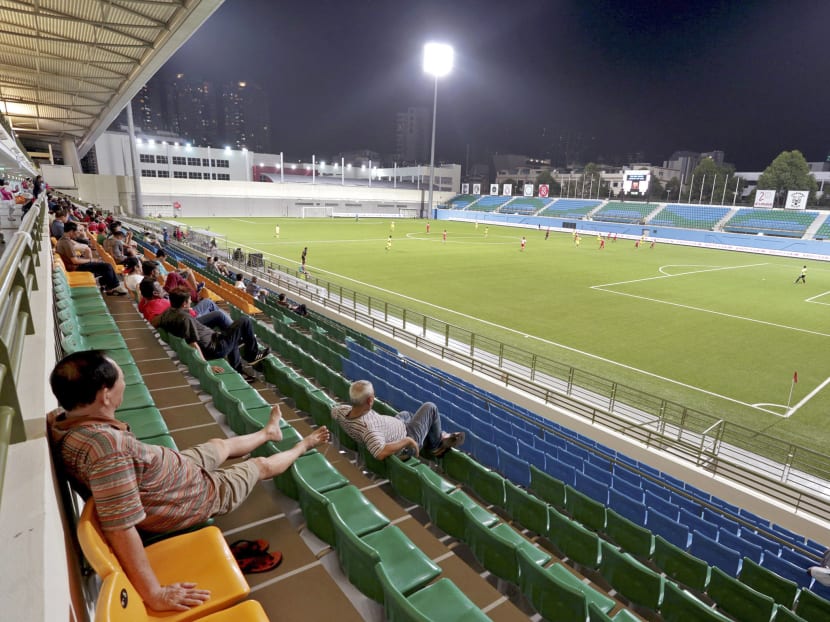
“Look at the S.League, what guarantees do they have for young footballers?” said Hong Kah Secondary School coach Mohamed Zainudeen, who has over 20 years of experience at schools level.
“Already now, there’s talk of uncertainty in the S.League next year. If you’re a parent or thinking of pursuing a professional career, there’s nothing out there concrete to work towards to. Until you get this thing in order, then only will people consider it a viable career.”
It is common practice for any newly-elected person or group to give themselves a 100-day honeymoon period in which they attempt to solve problems before coming up with a report card to analyse their actions and unveil their future plans. However, it has been 132 days and counting since the FAS elections and plans hardly seem to be forthcoming at the moment.
In fact, the media were even told that the new ex-co will be holding a press conference after the SEA Games to review its first 100 days in office but this has yet to materialise.
Even then, Sasikumar believes it could take a while before another Singapore captain will be seen hoisting silverware.
“Unless the top makes major changes, we can expect leaner years (to come),” he said.
Read more:
The Big Read: For SEA Games under-performers, the rot starts at the top





